Overview
This article dives into nine common legal mistakes that often pop up in influencer marketing contracts. It highlights just how crucial it is to have clear agreements to avoid misunderstandings and disputes down the line. By tackling topics like:
- Defining the scope of work
- Payment terms
- Content ownership
- Compliance with FTC guidelines
the piece shows how smart contract management can boost collaboration and safeguard the interests of both brands and influencers. So, what does this mean for you? Well, it's all about keeping things straightforward and ensuring everyone’s on the same page!
Introduction
Navigating the intricate world of influencer marketing contracts can feel a bit overwhelming, right? With the potential for legal missteps lurking at every corner, it’s important to tread carefully. As brands and influencers team up more than ever, grasping the common legal pitfalls becomes essential for building successful partnerships.
In this article, we’ll explore the nine most prevalent legal mistakes in influencer marketing contracts, sharing valuable insights that can help both agencies and creators steer clear of costly disputes.
So, how can brands ensure their agreements are watertight and mutually beneficial in such a dynamic landscape?
Creator Check: AI-Powered Management to Avoid Legal Pitfalls in Influencer Contracts
Creator Check is shaking things up with advanced AI technology that makes managing influencer agreements a breeze. It’s all about reducing the risk of legal hiccups, right? With features like an AI-driven inbox that automates email tagging and prioritization, agencies can easily keep track of all those important communications related to agreements. Plus, the platform’s automated payment processing takes the stress out of financial transactions, ensuring payments are timely and accurate—just how they should be according to the contracts.
So, what does this mean for you? Well, Creator Check’s AI negotiator steps in to craft smarter counter-offers. This means agreements are not only a win for creators but also meet legal standards. How great is that? This proactive approach minimizes the chances of disputes and makes everything clearer. By weaving in these AI-driven features, Creator Check empowers agency professionals to navigate the complexities of agreements confidently. Ultimately, this fosters stronger collaborations and helps protect your company’s reputation in our fast-paced digital world.
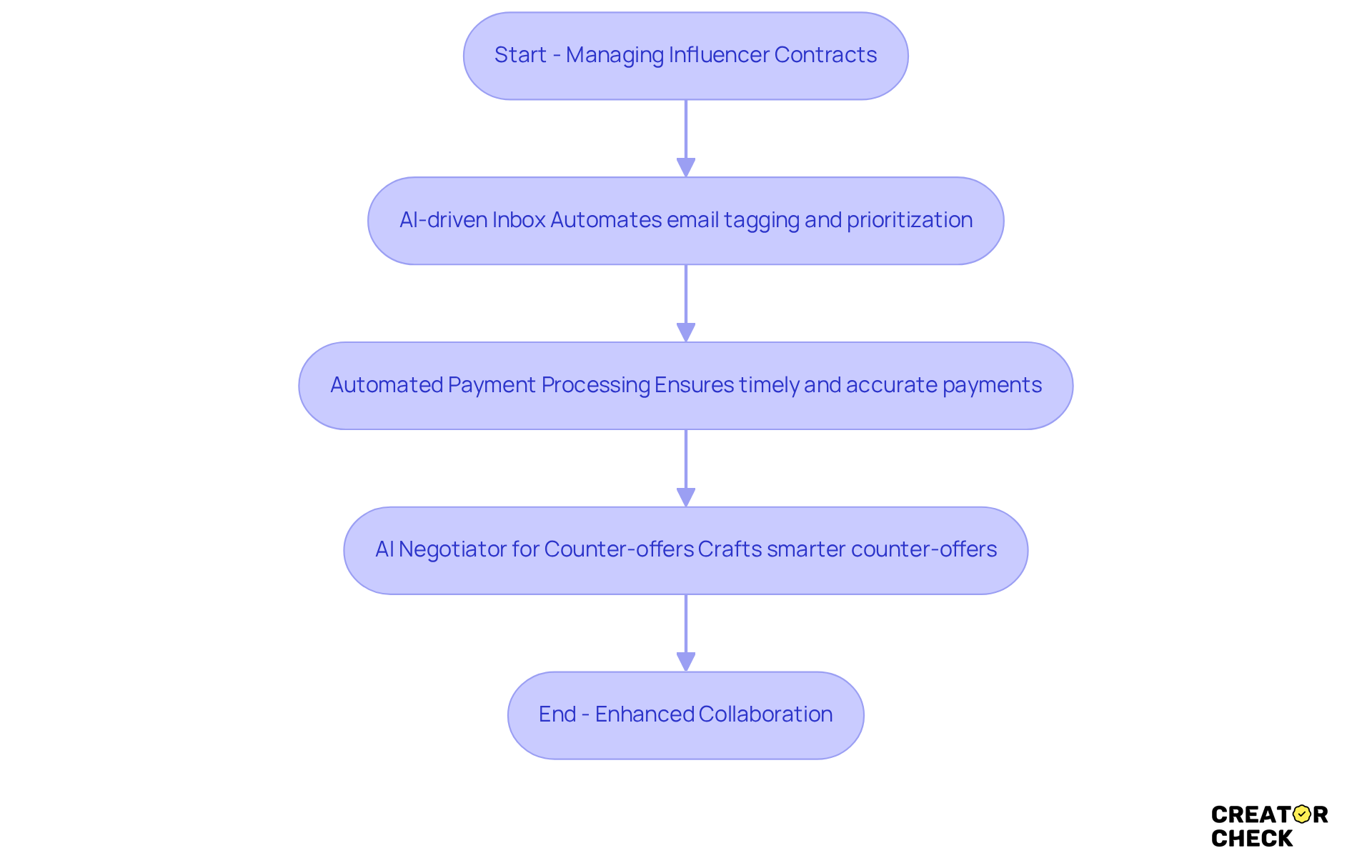
Define Scope of Work: Prevent Misunderstandings in Influencer Agreements
A well-defined scope of work is super important in influencer marketing agreements. It clearly lays out the specific tasks and responsibilities for both the influencer and the brand. This clarity helps prevent misunderstandings and sets clear expectations. Research shows that vague wording in agreements—especially regarding deliverables and timelines—can contribute to common legal mistakes in influencer marketing contracts, leading to costly disputes. To avoid this, agencies should make sure that all deliverables, like the type and frequency of content, are spelled out in the contract. For instance, a contract might say that the content creator needs to produce two videos and four stories each month, with deadlines for each item clearly laid out.
Plus, it’s a good idea to define performance metrics to measure success, like hitting a minimum engagement rate of 3% per post. Regular communication and updates during the campaign can further enhance alignment and help tackle any issues before they blow up. Experts point out that having clear expectations from the get-go boosts collaboration and understanding, so it’s essential for organizations to jot down every detail in writing. By focusing on a well-structured scope of work, influencer firms can avoid common legal mistakes in influencer marketing contracts, thereby reducing misunderstandings and building successful partnerships.
So, what does this mean for you? It means taking the time to get it right can lead to smoother collaborations and better results!
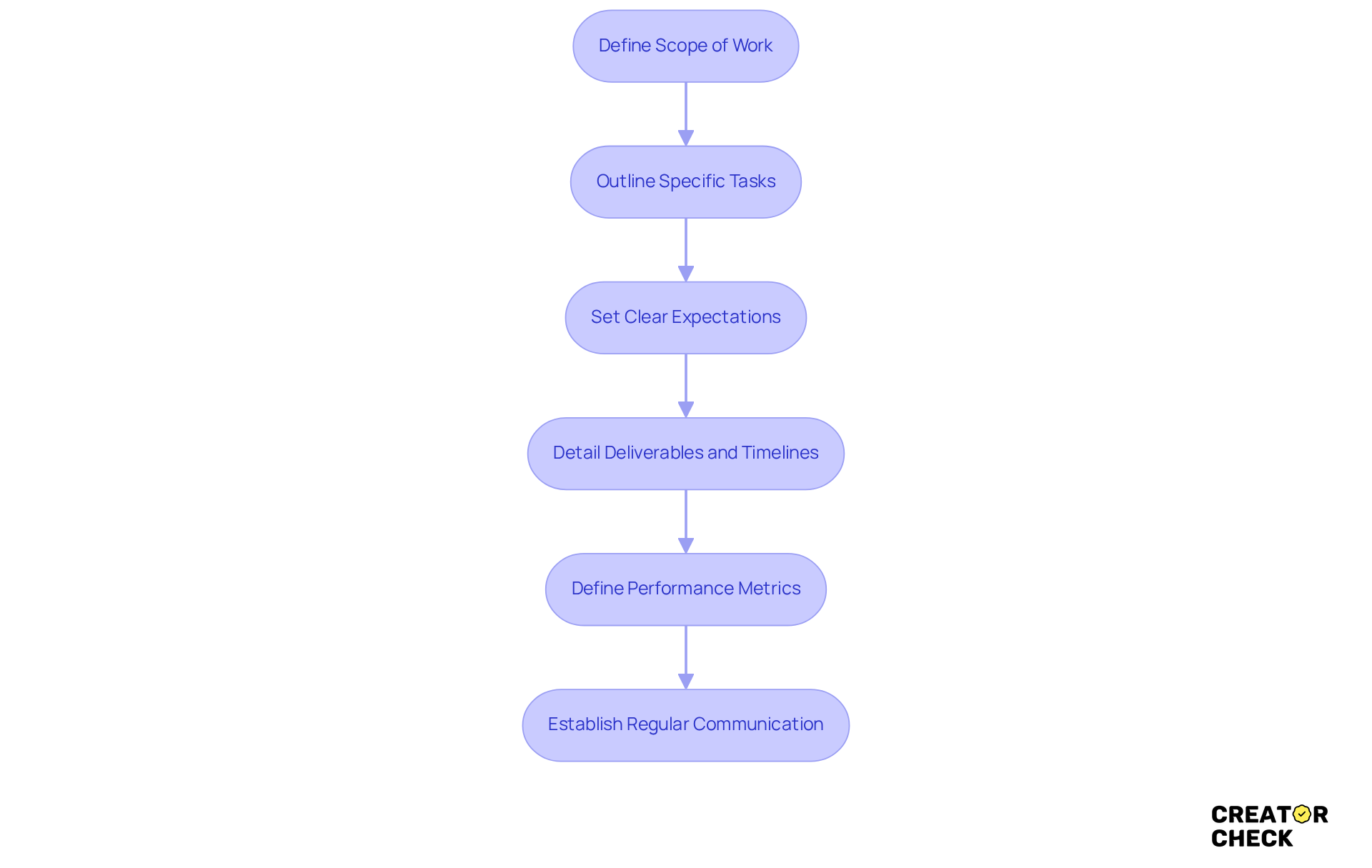
Clarify Payment Terms: Avoid Disputes Over Compensation
To avoid common legal mistakes in influencer marketing contracts regarding compensation, it's super important to lay out your payment terms in the contract. This means clearly stating the amount, the payment schedule, and how you'll be making those payments.
With Creator Check, you get a straightforward pricing plan at just $25 a month for each inbox your organization connects. This makes budgeting and financial planning a breeze!
But that’s not all—let’s talk about bonuses or performance-related incentives. Creator Check’s features, like the AI inbox and automated payments, really help in tracking and managing these incentives smoothly.
With these handy tools, your organization can enhance revenue management and streamline operations, allowing you to focus more on securing those brand agreements.
So, how does that sound for boosting your financial strategy?
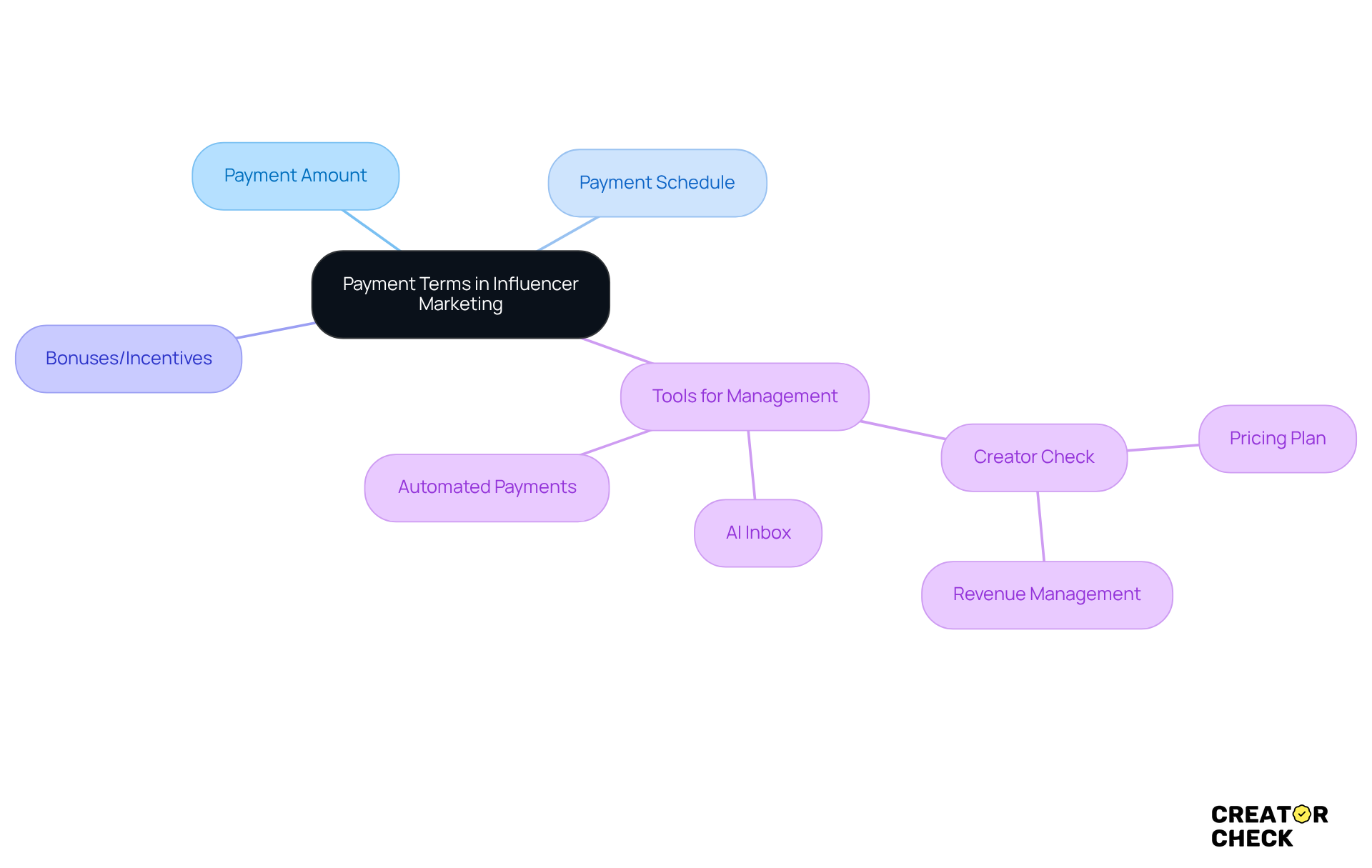
Specify Content Ownership: Protect Intellectual Property Rights
When it comes to contracts, it’s super important to clearly state who owns the content created during the campaign. We're talking about everything from images and videos to any other materials produced. By defining ownership rights upfront, agencies can dodge future disputes and ensure everyone is on the same page about how the content can be used and shared, which helps avoid common legal mistakes in influencer marketing contracts.
So, what does this mean for you? It’s all about clarity and understanding, which ultimately helps everyone involved feel more secure and confident in their roles.
Ensure FTC Compliance: Adhere to Legal Advertising Standards
When it comes to common legal mistakes in influencer marketing contracts, it’s super important to include clauses that ensure compliance with Federal Trade Commission (FTC) guidelines. This means being clear about paid partnerships and sponsorships. Agencies should take the time to educate influencers on why transparency matters. After all, it helps maintain trust with their audience and can steer clear of any potential legal hiccups related to common legal mistakes in influencer marketing contracts.
So, what does this mean for you? Think about how transparency can strengthen relationships with your audience. It’s not just about following the rules; it’s about building a community that trusts you. Let’s dive into how these practices can benefit everyone involved!
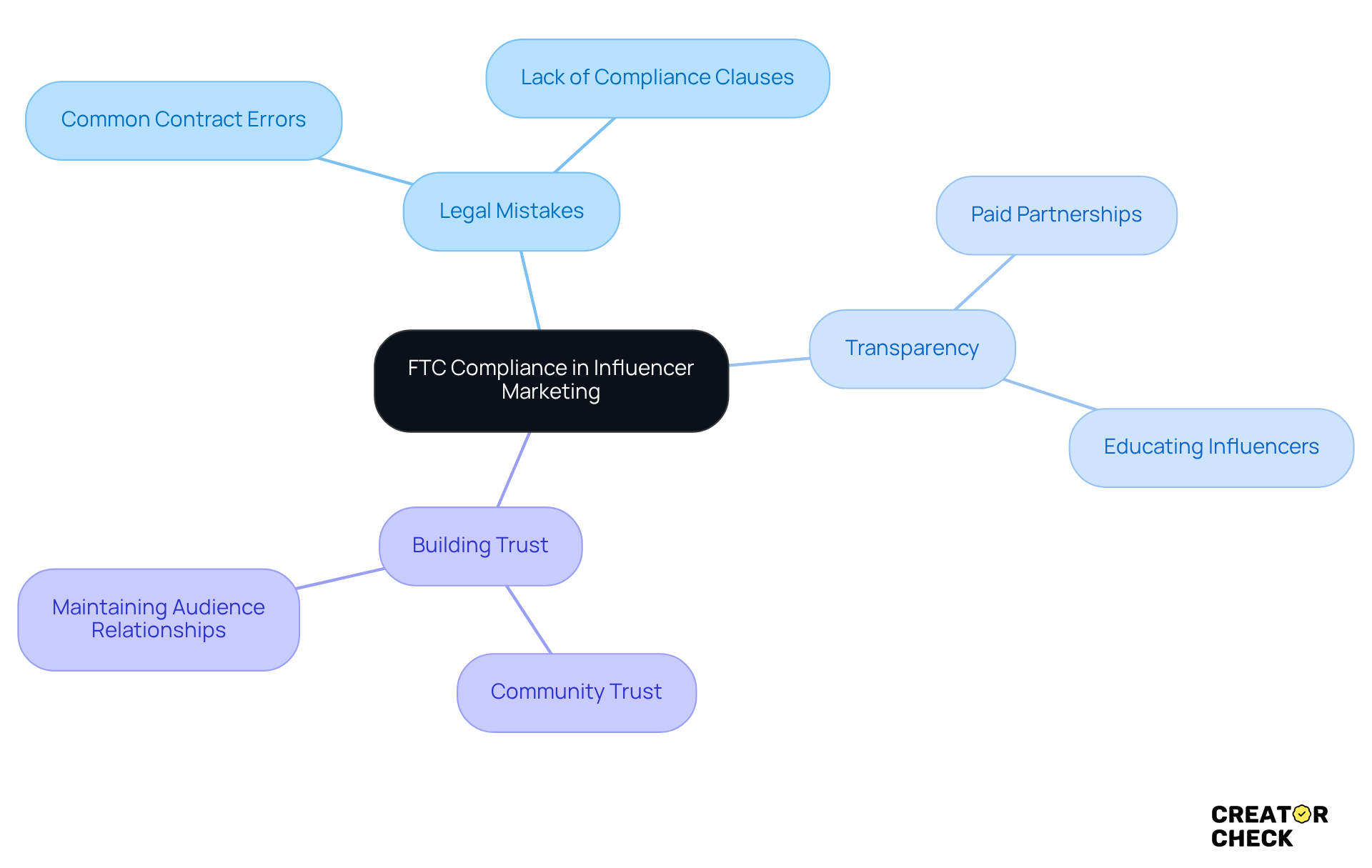
Implement Approval Processes: Safeguard Brand Messaging
Creating a solid approval process for content from influencers is super important for keeping your messaging on point and making sure you’re following data protection standards like GDPR. To prevent common legal mistakes in influencer marketing contracts, it’s a good idea to lay out the steps for content review and approval in your contracts, including clear timelines for feedback. This organized approach not only ensures that all content aligns with your organization’s values and messaging but also helps you avoid common legal mistakes in influencer marketing contracts that can arise from miscommunication or misrepresentation.
Have you ever faced issues where influencer content didn’t match what you intended? Brands without a clear approval process often run into this problem, leading to consumer confusion and even reputational damage. By setting up these guidelines, you can maintain control over your story and boost the effectiveness of your collaborations with key figures.
And let’s not forget about tools like Creator Check! This handy tool offers enterprise-level encryption and the ability to manage multiple inboxes, which can really streamline your operations and enhance your monitoring of content creators. So, what does this mean for you? It’s all about making your collaborations smoother and more impactful!
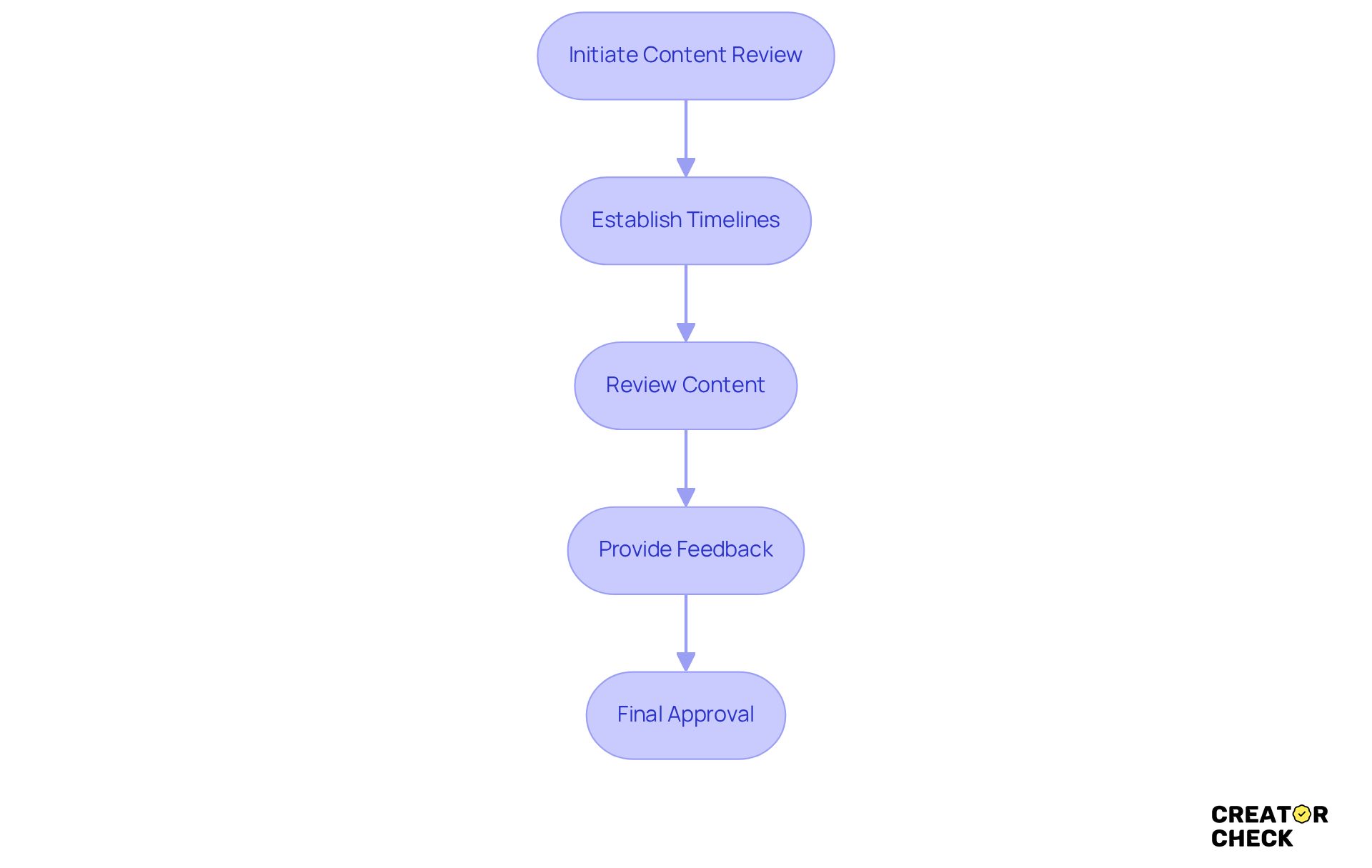
Incorporate Exclusivity Clauses: Prevent Conflicts of Interest
Including exclusivity provisions in social media agreements can really help prevent conflicts of interest and protect your company's investment. These clauses should clearly outline how long the exclusivity lasts and any rules about promoting competing products. By doing this, agencies can make sure that influencers stay committed to their brand during the campaign period.
So, what does this mean for you? It’s all about keeping those partnerships strong and beneficial!
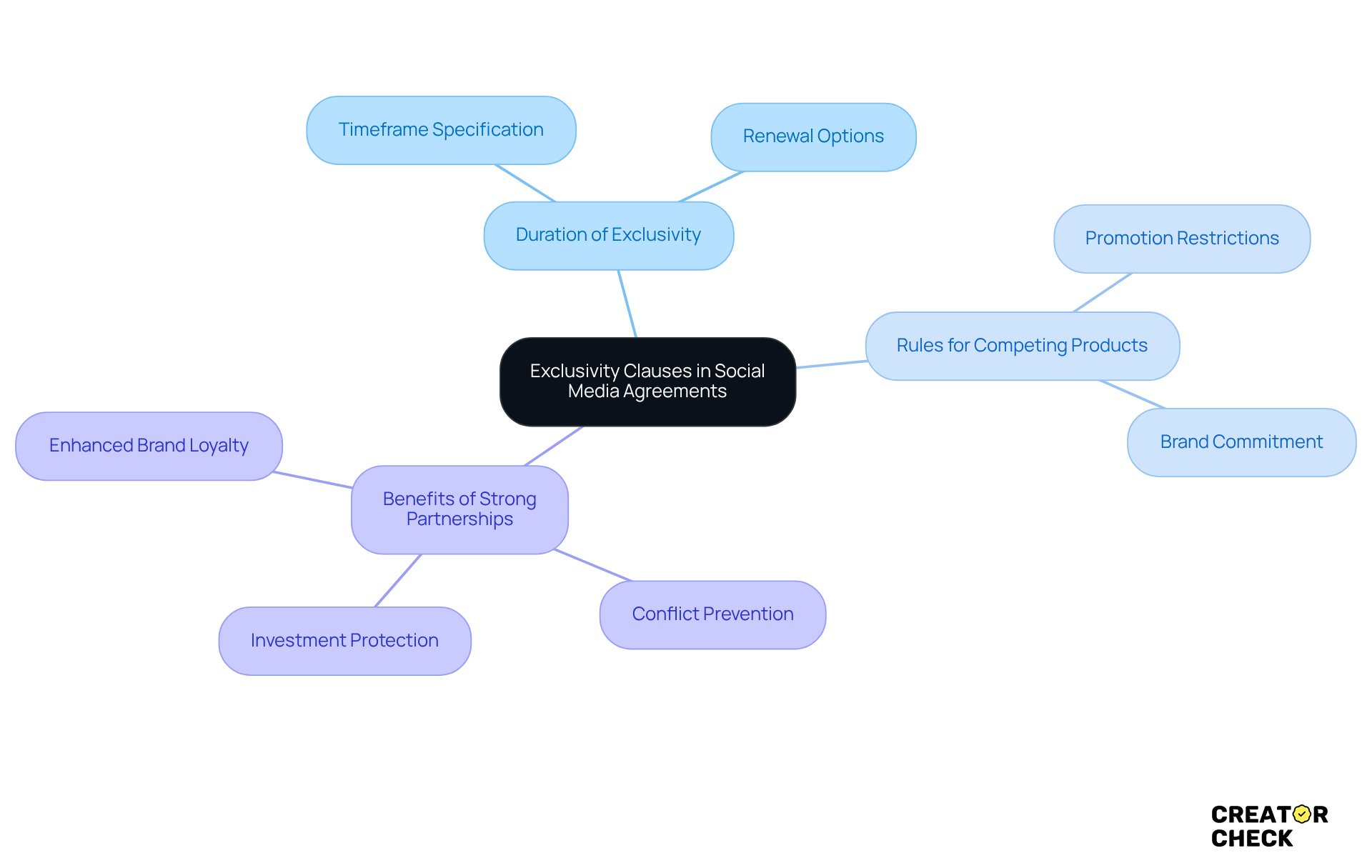
Establish Termination Clauses: Manage Relationships Effectively
When it comes to influencer agreements, avoiding common legal mistakes in influencer marketing contracts, such as unclear termination clauses, is super important for managing relationships effectively. These clauses should lay out the conditions that allow either party to end the agreement early, including the notice periods and any possible penalties for doing so. By providing this clarity, both companies and influencers can avoid misunderstandings, address common legal mistakes in influencer marketing contracts, and ensure a smoother exit if the need arises.
For instance, agreements might include provisions that let influencers terminate their arrangements if payment is delayed or if the brand makes too many excessive requests. This not only protects the individual’s interests but also fosters a sense of trust and respect in the partnership.
Experts in relationship management emphasize that understanding common legal mistakes in influencer marketing contracts, including unclear termination conditions, is crucial. One expert pointed out, "To prevent the typical trap of misaligned expectations, contracts with social media personalities should always specify a comprehensive scope of work that clarifies precisely what you, the content creator, are accountable for providing." This kind of clarity not only outlines responsibilities but also sets the stage for a more harmonious working relationship.
Additionally, including termination clauses that cover force majeure events—like natural disasters or pandemics—can further protect both parties. By anticipating potential disruptions, brands and influencers can tackle challenges more effectively, keeping their relationship positive even in tough times.
So, what does this mean for you? Well-defined termination clauses really serve as the backbone of successful partnerships, ensuring that both parties can exit gracefully if the collaboration no longer fits their needs.
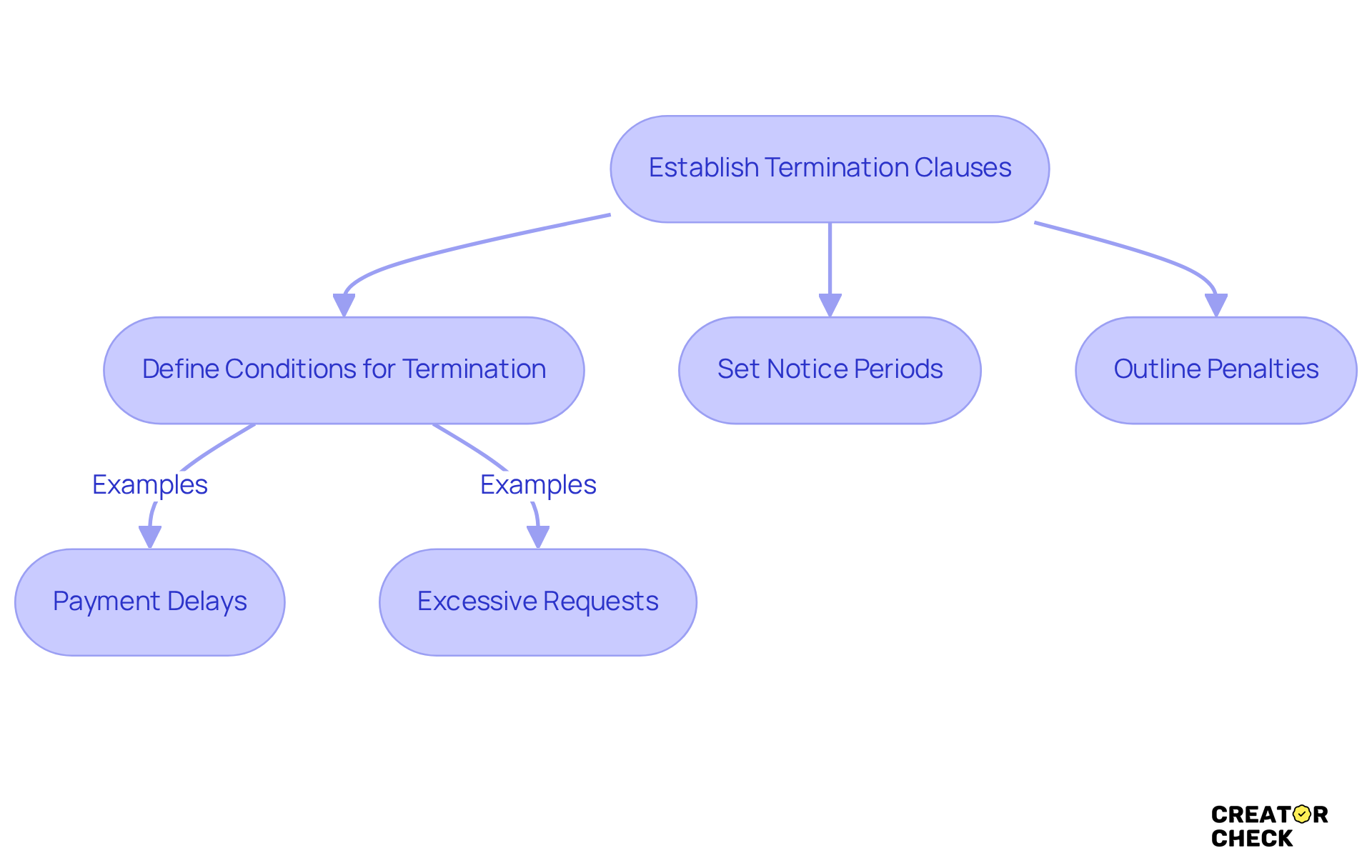
Include Confidentiality Agreements: Protect Sensitive Information
So, let’s talk about why incorporating confidentiality agreements in promotional agreements is a must. These agreements play a crucial role in keeping sensitive information safe during campaigns. It’s important to clearly outline what information is considered confidential and what both parties need to do to keep it that way. After all, protecting proprietary information helps maintain your competitive edge. And who doesn’t want that, right?
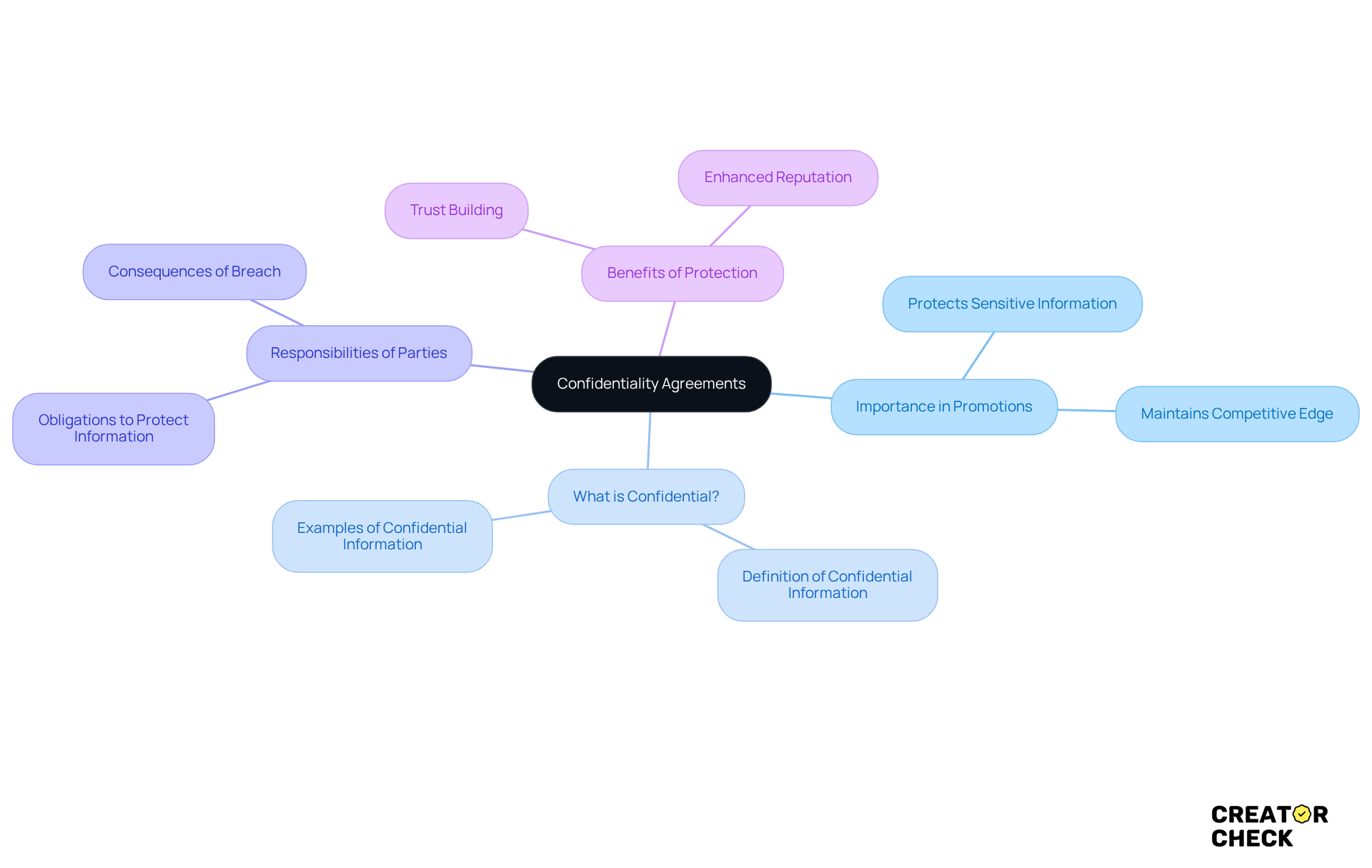
Regularly Review Contracts: Adapt to Evolving Influencer Marketing Trends
Regularly reviewing influencer agreements is crucial for firms to avoid common legal mistakes in influencer marketing contracts and keep up with the fast-paced world of influencer marketing. Did you know that 70% of friction points pop up before an agreement is even signed? That’s why organizations need to regularly check in on their contracts to avoid common legal mistakes in influencer marketing contracts and ensure they meet legal standards while reflecting what’s happening in the industry right now.
This proactive approach not only helps businesses stay ahead of new trends but also makes collaborations smoother by fostering transparency and flexibility. As industry leaders often point out, updating contracts to fit current marketing trends is crucial to avoid common legal mistakes in influencer marketing contracts and to maintain a competitive edge.
By welcoming these changes, agencies can dodge the risks that come with outdated agreements and boost their operational efficiency, leading to more successful partnerships.
So, what does this mean for you? It’s time to embrace the evolution in influencer marketing and make sure your agreements are up to date!
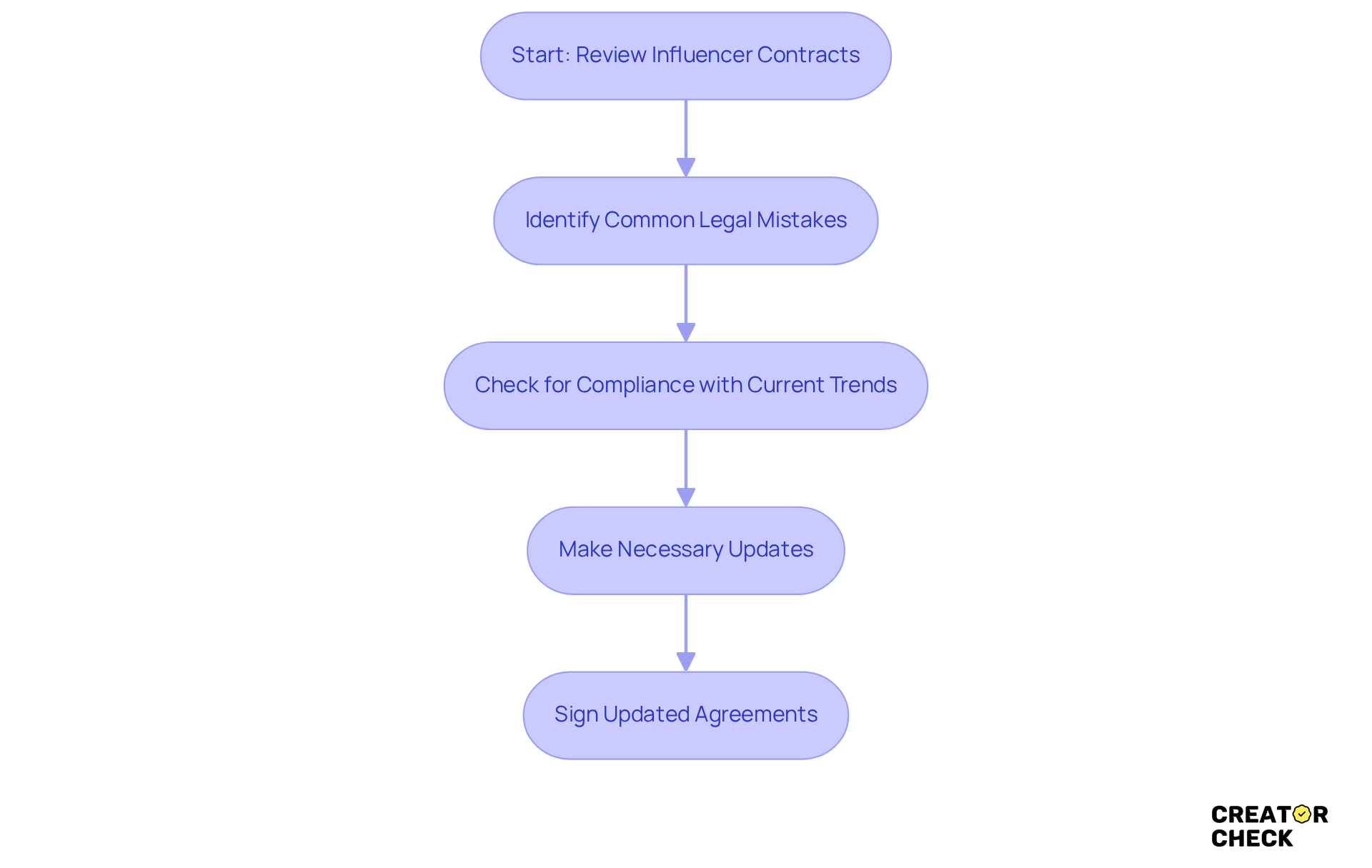
Conclusion
Navigating the complexities of influencer marketing contracts can be a bit tricky, but embracing effective strategies makes all the difference. By understanding and addressing common legal mistakes, both brands and influencers can build stronger partnerships and reduce risks. It’s all about clear communication and well-structured agreements, which really lay the groundwork for successful collaborations.
So, what are the key insights? First off, defining the scope of work is crucial. You’ll also want to clarify payment terms, specify content ownership, and ensure compliance with FTC regulations. Plus, don’t forget about implementing approval processes, incorporating exclusivity clauses, and establishing termination conditions. These steps are essential for protecting everyone’s interests. And remember, regularly reviewing contracts to keep up with evolving trends can really boost operational efficiency and minimize friction.
Ultimately, meticulous contract management is super important. By prioritizing these practices, agencies can avoid legal pitfalls and foster lasting, productive relationships in the influencer marketing space. As the industry keeps evolving, staying informed and proactive will be key to maintaining your competitive edge and ensuring that collaborations deliver the results you’re aiming for.
Frequently Asked Questions
What is Creator Check and how does it help with influencer contracts?
Creator Check is an AI-powered platform that simplifies the management of influencer agreements by reducing the risk of legal issues. It features an AI-driven inbox for automating email tagging and prioritization, and automated payment processing to ensure timely and accurate payments according to contracts.
How does Creator Check enhance negotiation in influencer contracts?
Creator Check includes an AI negotiator that crafts smarter counter-offers, ensuring agreements are beneficial for creators while meeting legal standards. This proactive approach minimizes disputes and clarifies expectations.
Why is defining the scope of work important in influencer agreements?
A well-defined scope of work specifies tasks and responsibilities for both the influencer and the brand, preventing misunderstandings and setting clear expectations. It helps avoid common legal mistakes related to vague wording, particularly regarding deliverables and timelines.
What should be included in the scope of work for influencer contracts?
The scope of work should clearly outline all deliverables, such as the type and frequency of content (e.g., two videos and four stories each month), along with deadlines for each item. Additionally, defining performance metrics can help measure success.
How can regular communication improve influencer campaigns?
Regular communication and updates during the campaign can enhance alignment between the influencer and the brand, allowing for the resolution of any issues before they escalate. Clear expectations from the start improve collaboration and understanding.
What are the key components of payment terms in influencer contracts?
Payment terms should clearly state the amount, payment schedule, and payment methods. This clarity helps avoid disputes over compensation.
How does Creator Check assist with payment management?
Creator Check offers a straightforward pricing plan of $25 per month for each connected inbox, making budgeting easier. Its features, including the AI inbox and automated payments, facilitate tracking and managing bonuses or performance-related incentives effectively.




